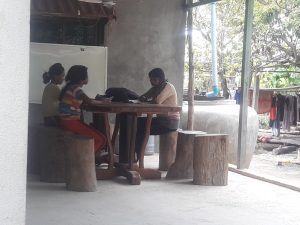 This article comes from Gillian, MRO’s Battambang Team Advisor, as she shares her first hand experience working with the Social Work Team and Emergency Foster Care Visits.
This article comes from Gillian, MRO’s Battambang Team Advisor, as she shares her first hand experience working with the Social Work Team and Emergency Foster Care Visits.
Arriving at work on a Monday you never quite know what the week will look like.
This week, it starts with a question from the visiting Youth Sector Manager, “Are you free tomorrow to come with the RCI (residential care institution) Directors as they go out into the village to have a practice run at filling out the Government’s reintegration forms? We’ll meet and discuss first, before going out to the village. We should be back around 2 or 3.”
“Sure,” I reply. Tuesday is not an MRO working day for me, but that’s an opportunity too good to miss.
Then the Social Worker, Savin, asks me, “Would you like to accompany me to an EFC (emergency foster care) Family visit today? I’m leaving in 10 minutes.” “Sure, I’ll come.” And I quickly refill my water bottle, find my name tag, and we’re off on the motorbike.
We didn’t get very far. The back tire is flat. After a little discussion, Savin goes off to refill the tire, and we’ll cross our fingers it’s not a bad leak.
We travel along the main road to Pailin, passing other bikes, slow farm vehicles, and are passed by container trucks, trucks full of rocks, very fast cars, as well as other bikes. Then comes the crosswind. That is not much fun at all feeling the bike being blown across the road, towards oncoming traffic. Nearly one hour later, we turn off onto a dirt road (that tire is feeling mushy again) before arriving at the home of the EFC Family.
There are four foster girls from two different families here. We can see three of them preparing the vegetables and meat for the midday meal. As we wait, one more arrives with some veggies to add to the pot.
Savin is here to check on two of the girls, and as she gets out the coloring pencils and paper, I sit with the Foster Mother and talk about life. I am there to observe interactions between everyone, as well as to be Savin’s Support Person to fulfill MRO’s policies. The paper and pencils give the girls something else to focus on as Savin talks with them.
The other pair of sisters get curious and come and sit with me. We talk some more and I discover they are part of the growing group of ‘emigration orphans’ where one or both parents have gone to work in another country. We talk about their family situation, and I share too how I miss my children and grandchildren in New Zealand. They are learning English and so I tell a story in English and then Khmer. After that get them to tell it to me so I can see how bad my Khmer grammar is. They are very proud to count up to 31 and say the months of the year in English.
The mum calls them to finish helping with lunch, as more family arrive back from school and work, so they can all eat together.
We say our goodbyes and we’re off again. Crossing our fingers that the tire holds up and the rain doesn’t come, we’re off on our hour-long motorbike ride back to the office.
 M'lup Russey Organization child protection services none profit organization
M'lup Russey Organization child protection services none profit organization